|
|
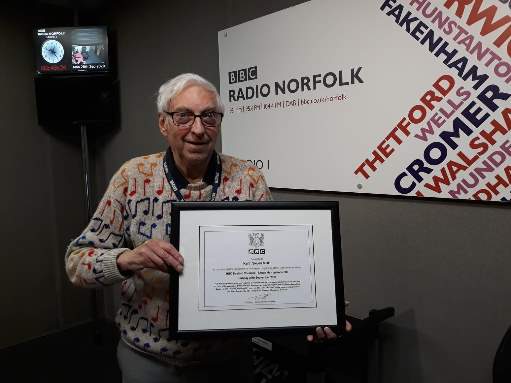
|
| Keith with a certificate marking his 500th programme on BBC Eastern Counties signed by the BBC's Director General. This photo was shared on Facebook by BBC Radio Norfolk. |
In September 2020 the legendary disc-jockey Keith Skues presented his 500th, and final, regular programme on BBC local radio in the east of England. After 61 years on the air, he was
retiring from full-time broadcasting.
Earlier that evening Ray Clark interviewed Keith about his long career which has included time on British forces broadcasting, the BBC, commercial radio and, of course, the pirates.
We are grateful to Ray for sharing the recording of that conversation with The Pirate Radio Hall of Fame.
The chat began with Keith talking about how he first got started in radio.
KEITH SKUES: Well I pushed myself forward as soon as I was called up for National Service. I was hoping that I could possibly get an attachment to the British Forces Network, because a radio broadcaster called Roger
Moffatt who I used to L.O.V.E with a small L - his radio programme - I wrote to him and asked him how he actually branched out into radio and he suggested the forces broadcasting service. A lot of people of the Radio One days, and
the BBC Light Programme days, the Home Service days, got their break, their initial break, with the British Forces Network so, as soon as I went into the Royal Air Force, I made approaches to British Forces Network in Cologne to be
told “the only chance you've got is being posted to Germany and, as you're National Service, you're only around for two years, so your chances are very slim.”
RAY CLARK: So how did you overcome the problem?
KS: Well my station commander did eventually post me to Germany, to north Germany, and I wrote to the station director who then invited me down for an audition at Cologne. I did the audition. I read a news bulletin, and was asked
to (rustles paper) turn over the page. I turned over the page and went “aaargh” because it was all in German and I didn't speak German at that stage of the game. The engineer on the other side just said “failed”.
And that was it. I had failed. But I was accommodated overnight because I had come quite a long way from north Germany down to Cologne and the British Forces Network accommodated me over night. I said “during the daytime, can I
go and have a look around the radio station? I'd love to see the library, the engineering side - how a radio station works” - which I did. And then I went back to my RAF unit. About a month later my RAF station commander got a
phone call from the BFN boss saying could I contact him, which I duly did. He said “there was interest in what you'd asked during your trip around the studios. We can't allow you to broadcast but if you'd like to come as a
Presentation Assistant, in other words a dogsbody, we'd be pleased to process you.” So that's how I started really, just as a dogsbody, emptying coffee cups and ashtrays and things like that, putting records away in the library,
and then eventually a sports editor came to me and said “would you be willing to have a bash at reading the football results?” which I duly did. Two or three months after that, I was asked if I'd like to present a
classical music programme. Well I didn't know much about classical music. I could pronounce ‘Chop-in’ and Tchaikovsky (laughs) - that's about it. So I did that and eventually, towards the end of my time, I was offered a late night
programme. I then applied for an extension after National Service and they said “no - you'll have to sign on” so I signed on. I approached the British Forces Network for a return posting to Germany as a broadcaster and they
said “no, we're going to send you to Nairobi in East Africa” which is a long way away. Anyway I did the rounds of forces radio stations overseas - in Nairobi, in Aden and elsewhere - and eventually came back in 1964, just as
Radio Caroline was opening and that was... I couldn't believe what was happening in the United Kingdom. I thought “a pirate radio ship - this sounds very interesting!” And I eventually made contact with Radio Atlanta - not
Radio Caroline but Radio Atlanta - and a chap called Allan Crawford who was the Managing Director said “we'd just like you to do a voice test”. I went and I did the voice test and all I said was
“and now....” and he said “you've got the job!” Well then I was told I'd have to wait about a month because they were amalgamating with Radio Caroline. Radio Caroline as such was on the mv Caroline and that
sailed round to the Isle of Man to become Radio Caroline North and Radio Caroline South was on the Mi Amigo. So I joined Radio Caroline South at a similar time to Tony Blackburn, which was in 1964.
|
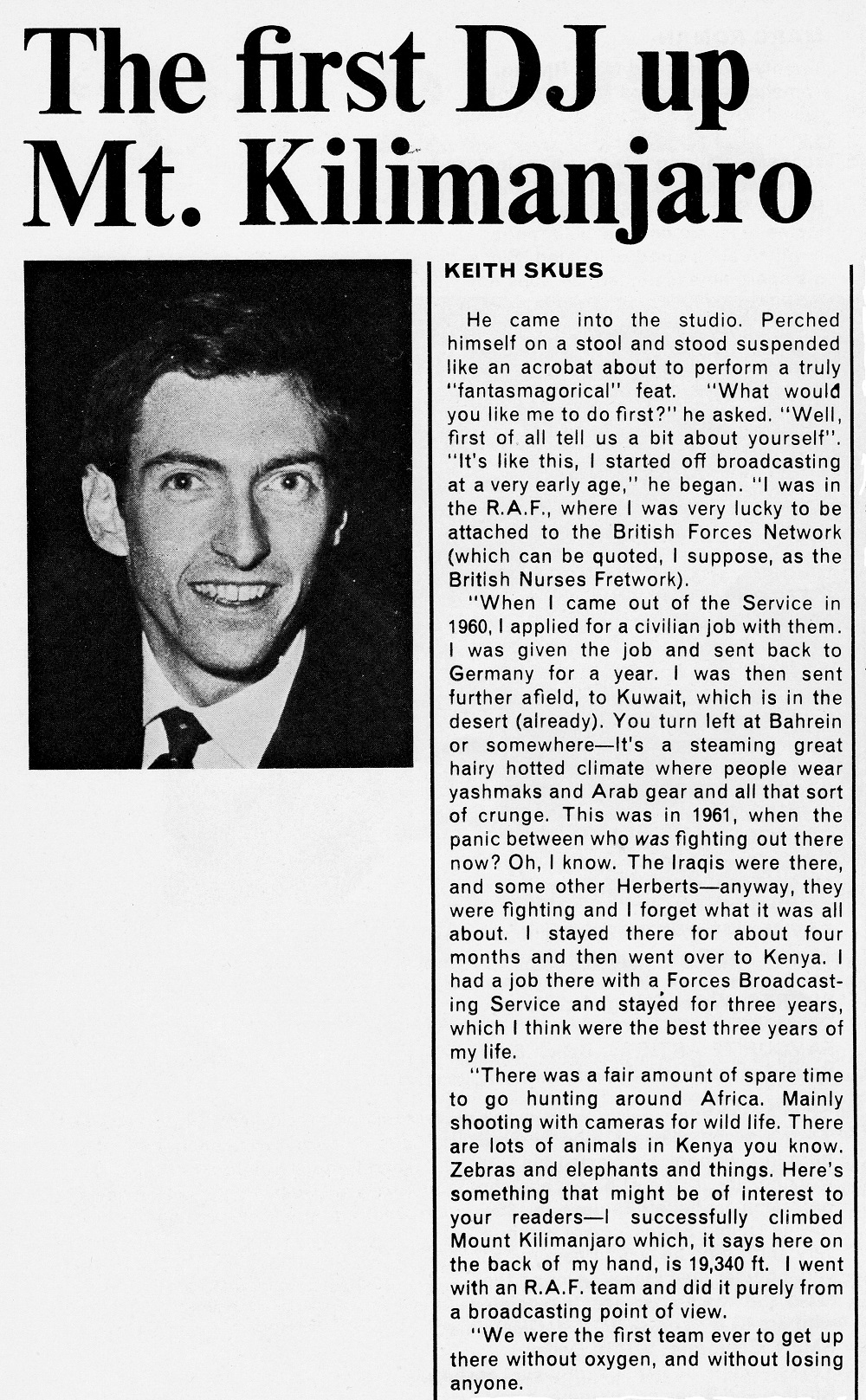
|
| Part of an interview with Keith from ‘Beatwave’ magazine, 1967. |
RC: And what was your brief once you'd joined Caroline, Keith? Did they just take it that here was an experienced broadcaster that had been with the British Forces Broadcasting Service so just get on with it, or was
there someone to say “you do it this way Mr Skues”?
KS: Yes. There was a - not a Programme Director but a chap who was in control of the music - a chap called Ken Evans, an Australian, who advised me what to do and what to say - not exactly what to say because
I had a style anyway so, as a broadcaster I was OK, it was just what I was allowed to say with reference to the records, and not to send up commercials. Yes there was general guidance and, back in London, there was a Programme
Controller called Chris Moore who would come out to the ship ever so often and brief us what was going on.
RC: Yes, you had your own style because I, as a 10 year old lad, remember listening to this guy talking about “Mrs Woman” and “jambo world” and “Afghanistan Beetroot Week” and
here I am at the age of 66 and I still remember the daft, um the wonderful, lines you were coming up with.
KS: Gosh. I wish I'd spoken to you earlier. I'd forgotten about all those things! Yes, I'd got a style which was different I suppose and I didn't want to sound like every other DJ. I just wanted to be different.
RC: So Radio Caroline for 18 months or so... And Caroline had started off big time but Radio London had come along and sort of stolen the thunder, hadn't it?
KS: Yes. That came along at the end of 1964, on the mv Galaxy, a much larger ship, a much more powerful radio signal and excellent DJs. I thought “wow” so, although I worked for Radio Caroline, in my cabin I used to listen
to Big L, Radio London, and I thought “that's a great station”. But I stayed with Caroline. Initially.
RC: And then there came a parting of the ways. You went, via Luxembourg, to Radio London. Was this all part of the big Skues plan, or had you had enough of Caroline or was the offer better from Luxembourg?
KS: No. What happened.... On Caroline I was sent a reel to reel tape from a chap called Derek Taylor who was the Press Officer for The Beatles and he was in America and had been to an audition of a group called The Byrds. Now we
had a group called The Birds in Britain - B.I.R.D.S and in America it was the B.Y.R.D.S - a totally different group - and they recorded a thing called Mr Tambourine Man.
He sent me this reel to reel tape, 7½ inches per second. It reached me eventually out on the ship and I listened to it and I thought “wow, this is good” so I
played it on the radio. But it hadn't come out as a record as such. It was just purely a reel to reel tape. It got a massive reaction at Caroline House: “where can we go and buy this?”, etc, etc.. Eventually it was released
on CBS Records as a single and it became a massive hit. And how I ended up on Luxembourg was via CBS Records. A chap there called Ronnie Bell - he didn't want his name mentioned, that's B.E.double L! (laughs) - and he contacted me and
said “we'd like to employ you at Radio Luxembourg to present the CBS Records Show, and you'll be paid a guinea (£1.05) a minute.” I thought “wow, this is big money” so I joined Radio Luxembourg for three
months but it was nothing like Radio Caroline, or indeed Radio London, or any of the pirate stations where everyone is friendly and everybody gets on with everybody else. There you sort of reported for duty five minutes before you were
due to speak; you met the producer who said “you've got 20 seconds or 30 seconds to announce this; when it fades, do this, do that” and then you leave the building. Then the programme goes out the following... whatever
day of the week it was. And I thought “I'm missing the camaraderie side of Radio Caroline” and, by coincidence, I happened to be in a pub one night just round the corner from Caroline and London - they were based in Mayfair
- and this chap came up to me and said “how would you like to join Radio London?” and I said “what?”. He said “Yes, there's a vacancy coming. Would you like to meet the Managing Director and he'll talk
you through it.” So I met Philip Birch and the rest, as they say, is history. I was offered the job and out I went to present the mid-morning show, 9 o'clock 'til 12. There was a chap called
Tony Windsor - Tony “Hel-lo” Windsor - who is sadly no longer with us. He'd decided to leave the ship and there was a vacancy there and I accepted it. And thoroughly enjoyed my time with Big
L.
RC: This was a huge gig, wasn't it Keith? Because Radio London was the most listened-to station, the most professional and your audience must have figured in millions when you were doing that programme.
KS: That is correct. Yes - and when we came off the ship - well, it also happened with Caroline - when we came off the ship after say two weeks and you were going on a week's leave, there'd be hundreds of young people - basically
teenagers, school children, young housewives - at the quayside in Harwich to greet you as you came off the ship. Then some of them would travel by train to Manningtree and others would go on to Colchester or Chelmsford. It was
really a magic era.
RC: While you were on the ship, it wasn't always - forgive the pun here Keith - plain sailing. You were sitting out there in horrendous conditions at times. Did it ever get so bad that you thought “what am I
doing here”?
KS: I did that regularly on Radio Caroline. On Radio Caroline we had bad weather and it was a much smaller ship than the Radio London ship and I didn't enjoy the rocking around, and the tossing and turning, and everything else.
Big L was much smoother but, yes, quite often the weather was not terribly good. Even when you were broadcasting suddenly you know.... you'd have to put a coin on the arm of the turntable which plays the record. Because you got rough
seas, it would jump and the record would (makes needle scratching noise) go right across so I'd put a shilling or two shilling piece on top of the cartridge - which didn't do the cartridge any good, or indeed the record, but at least
it played. Yes, bad weather was the downside of that but nevertheless the listening figures were absolutely superb and both Caroline and London were making money.
RC: Until August 14th 1967 when the government said “no more” and, a few weeks later, you were in at the start of Radio One. Did you apply, did they come to you, did you jump ship seeing that everyone
else was jumping ship and that was the wise thing to do?
|
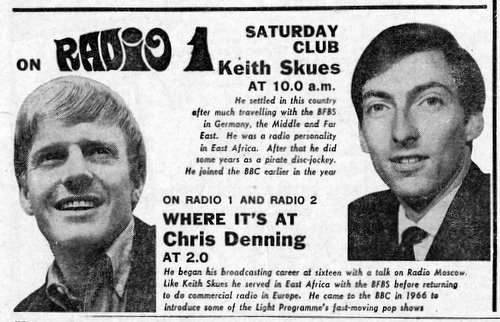
|
| Keith in ‘Radio Times’. Cutting courtesy of George Morris. |
KS: Well I didn't know anything about it other than the fact that there was going to be a new pop station. I didn't approach the BBC but a person called Johnny Beerling, who was an Executive Producer at the BBC
Light Programme, unofficially visited Radio London to talk to people like Tony Blackburn and John Peel. I wasn't on the ship at that particular time. He thought that the Radio London DJs were what was
wanted on Radio One. I'm not sure if he went to Caroline but he certainly talked to a number of Caroline DJs including, I think, Dave Lee Travis and maybe others as well. So I was just eventually
contacted - um, I can't remember how they contacted me now - anyway I was contacted. Would I like to go for an interview at the BBC? Which I duly did and met a guy called Bill Bebb. He was going to be the producer of a programme
called Saturday Club. Well, I'd listened to Saturday Club as a kid, as a teenager, before I was ever involved in radio at all and I thought Brian Matthew and that programme were just superb. Saturday morning at 10 o'clock on
the BBC Light Programme. Little did I realise that I was going to be offered that particular job because they were moving Brian on to Radio 2. I got the job and I met the producer and he said “it's a very strict format for this
particular programme. You'll have ten seconds to do this and eight seconds to make that announcement” and I said “hang on. How am I going to get my personality across in 10 seconds?” and he said “if that's your
attitude, we don't want you”. (laughs) So I agreed to just say “that was, here is...” and that was more or less the format. So I got the job. Brian Matthew was very upset about losing the programme. Understandably -
he'd been there for ten years or whatever it was, presenting Saturday Club. He was quite rude about the BBC and he had a go at me. He referred to me as a talented bingo caller in one of the national newspapers. Years later I worked
with Brian, when I was a member of the BBC on Radio 2 and he was Radio 2, and we compèred some event in Brighton. We had to share the same dressing room. When I said to him “hello Brian”, you know, “Keith
Skues” - he didn't know me by sight - I said “you weren't too pleased when I took over your programme. You called me a talented bingo caller in one of the national newspapers” and he said “well at least I
called you talented!” (laughs)
RC: Have you ever tried bingo calling, Keith?
KS: No, I've never been to bingo. I've never played bingo in my life. I don't know anything about it apart from a load of numbers but Brian and I remained pals right to the end, until he passed away.
|
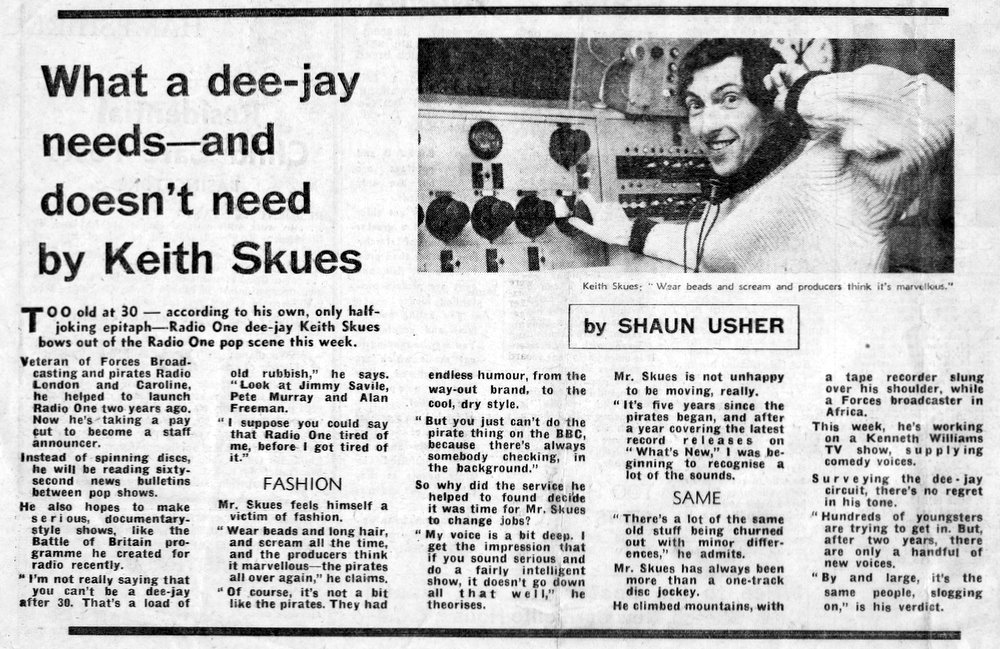
|
| Keith moving on from Radio One, interviewed in the ‘Daily Sketch’. Cutting courtesy of George Morris. |
RC: So quite a history with the BBC. You did a big documentary series, The Story of Pop, then Radio 2 to follow, and news duties, so a long time with the BBC but eventually commercial radio beckoned.
|

|
| Keith on Radio Hallam. His biography in ‘Radio Guide’ magazine's A-Z of commercial radio DJs, published 1976. |
KS: In about 1973 the IBA (Independent Broadcasting Authority) announced that they were going to set up local commercial radio stations and one was going to be based in Yorkshire. Well I've got no qualifications to
go to Yorkshire but I was approached by Yorkshire Television to become the Programme Controller for Radio Hallam. We had to apply to the IBA to seek permission to actually operate but we were also against major competition which was
run by Michael Parkinson. So the two of us had to go down to the IBA in London and say why we thought that our station was the best. And fortunately we won. So I became Programme Controller and a director on the board of Radio Hallam,
operating there from 1974 right the way through until, well, 20 years later or so. Because I was a reservist in the RAF I got activated for the Falklands and Gulf War 1. I had to go on duty there but I didn't take any money from Radio
Hallam. I said “I'm not taking any money. The RAF will pay me whilst I'm out there” but when I came back from Gulf War 1, to the radio station, I reported to reception in Sheffield and the receptionist said “yes, can
I help you?” and I said “I'm Keith Skues. I'm back from the Gulf War” and she said “pardon. What are you talking about?” She said “I've never heard of you”. I said “I'm the Programme
Director of Radio Hallam”. She said “no you're not”. The radio station had been taken over by Metro Radio up in Newcastle and I wasn't aware of any of this. So I was out on my neck and that was the end of my career
with independent local radio. The end of my career as such. The following day I was meeting up with a lady friend Gillian Reynolds who was a journalist and she, at that time, was the Programme Controller of the Liverpool station, Radio
City. We met in London for lunch and she asked me how I was enjoying life, etc.. I said “I've just lost my job on Radio Hallam” and she said “really. Why?” She was also a freelance journalist for the Daily
Telegraph. The next day she gave me more than a half page spread - it was a massive article - about me losing my job.
RC: You suddenly appear in East Anglia via BBC Radio Norfolk. How did that come about?
KS: So there I was, out of a job as Programme Controller and a Director of Radio Hallam. I sold all my shares and went back into the RAF because I still had a short time to do, another six months or so with the RAF, and I was stationed
at RAF Marham in Norfolk where the Tornado pilots were, the ones I'd met in the Gulf War - they were stationed there. I was a Public Relations Officer there and we received an invitation from Radio Norfolk to visit a new studio which
was being opened in King's Lynn. So I went along with another Squadron Leader who was also working at Marham. We went into the building and sort of shook hands with various people, and this particular person came up to me and he said
“Cardboard Shoes?” I hadn't got my name tag or anything from the RAF. I was just in civilian clothes and I just spoke to him “very pleased to meet you. Delighted to be attending the opening of your new studio”
and he said “you're the only man I know in the world who enters a room voice first”. (laughs) And that was David Clayton who was then, I don't know what job he had on Radio Norfolk - he wasn't the boss at that stage of the
game - but he went to his boss, a chap called Keith Salmon, and said “we'd like to put Keith Skues on, just for a one-off programme, if we can do that in a couple of weeks' time”. Which I duly did and, on the strength of
that, I was offered a year's contract to do a nightly show from 10 o'clock until 1 in the morning across the eastern counties. So that was the birth of my time on BBC local radio in the eastern counties and I'm still there - ish. Just
about.
RC: And just coming up for the 500th edition...
KS: Later tonight. Yes - and then it will be goodbye world (laughs) I'm afraid, yes.
RC: You know, I somehow don't believe that Keith. I think we haven't heard the last of Skues but, whilst we've got you, what is the legacy of Skues? When you get a bit older and you put your feet up and you think
“I didn't have a bad run there”, what does radio owe to Skues?
KS: Well I've just been very lucky to have been in the right place at the right time and done the jobs that I wanted to do - and even better jobs that I didn't expect to do, as in rising up from a dogsbody up to be an announcer,
a presenter, a producer, an editor, a station manager - so I've gone from nothing right the way to the top. I can ask for nothing more really. I just gracefully retire - but I don't want to. Now, as you get older, unfortunately,
the “Hobson's choice”, the voice, goes. A lot of people, towards the end of their careers, like the Jimmy Youngs and the Brian Matthews, Desmond Carringtons, their voices didn't sound too good on Radio 2 towards the end of
their careers because they just carried on and on and on. Now the BBC is saying they want local radio to go for a younger audience so really I'm not part of that system. I thought “well that's time to gracefully retire”.
But that's from regular programming. I'd still like to carry on and do periodic shows from time to time. That would be good.
RC: And of those years, those broadcasts that you've done Keith, your most memorable moment... Is there one particular or two particular moments that really you got an immense thrill out of?
KS: No. Whichever station I worked for, there were always highlights on all of those stations. I just generally enjoyed life and I was just flattered by the huge response from listeners, whatever station it was I was working with over
the years. I mean the pirates were the most... that was the most mail we ever got - and you as well, working with Caroline, you know you got massive mail bags. We all did and that was very flattering. And even with the BBC, I mean, I
was surprised how many letters and emails I received in the last three weeks when I was saying “well, that's time to go”. I'm going to have to sit down and respond to those - and they total hundreds and hundreds. I mean
that. I'm not making that up. I just didn't realise that there were so many listeners to the late night programme.
RC: One of my regrets is that I can't pronounce “meteorological” so I could never read the shipping forecast but I'll get by with that in my career. What about yours? Any one regret? Something you really
wish you'd done and weren't able to, or weren't in the right place at the right time?
KS: No. I've just been very lucky having been in the right place at the right time, or being in the right place at the wrong time, or being at the wrong time in the right place, it's all just fallen into place. It's a matter of luck
I think.
After the main interview was finished, Ray and Keith chatted for a time about the Pirate BBC Essex broadcasts from Harwich in which they had both participated...
RAY CLARK: I always remember we were down in the mess room. You were on air, reading your emails, and it was about the time that I recorded quite a few people for the documentary that I did
(about Radio Caroline) before my book came along, and I knew that you'd been at the Corn Exchange on a particular date in Chelmsford. I think we'd had a couple of drinks downstairs and Dave Cash was there,
everybody was joining in and we were having a bit of a chuckle - and probably doing Skues impressions as well - and then we got to work with a spoof email: “Dear Keith, I remember meeting you at the Corn Exchange in Chelmsford in
1966 when such and such an artist was there...” and you were reading this as you went along saying “ah yes, I remember that. I actually did that....” “I wonder if you'd like to meet your love child”
(laughing) and you stopped just in time! And the ship just fell about because we'd almost got you. We almost trapped you but you were professional enough to read one line ahead and saw what was coming. That was funny.
|
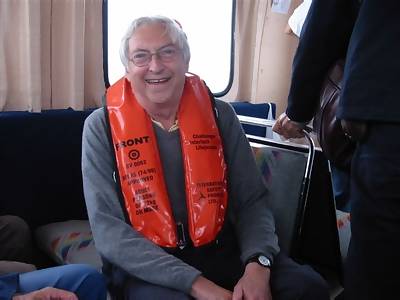
|
| Keith on Pirate BBC Essex in 2007. Photo courtesy of Duncan Johnson. |
Keith Skues: Yes, you got up to some interesting tricks there. Each year I thought “what are they going to get up to on this particular occasion?” and the final time was a bit worrying because I came to
park my car - I was staying overnight at the local hotel there - so I went in and said “where can I park?” The car park was full and she said “oh you can park in the space marked ‘mayor’ just in front of
the Halfpenny Pier” so I said “OK, but will he be coming?” “No”, she said “it's Sunday night. No problem at all.” So I parked there. And then I was presenting the programme, towards the end of
the programme, which would be just about midnight - I don't know if you were involved in this, I presume you were - two police officers, lady police officers, turned up, standing behind me while I was broadcasting. I opened the
microphone and started rabbiting away and they leant forward and said “we're arresting you for parking your car in the mayor's space”. And they carted me off. Now this was known to all the BBC Essex personnel and there was
dead air. I don't know who jumped in and finished it. I vanished off the radio. I never finished my programme. You know, I thought it was for real - but it wasn't. It was a joke. And the following night - or the following week or
whenever it was - I rang up the police station in Harwich and asked if the two lady police officers would be willing to come along and start presenting my radio programme, just as a gimmick. Which they did.
RC: Brilliant.
KS: It was just so much fun. I really enjoyed it. BBC Essex have got to be thanked for all the work they put into it - and great radio shows. It was wonderful to meet the audience as well - our listeners.
Our thanks to Ray Clark for providing the interview.
Back to Ray's conversation with Terry Bate.
Ray's interview with Philip Solomon is over the page.
|

